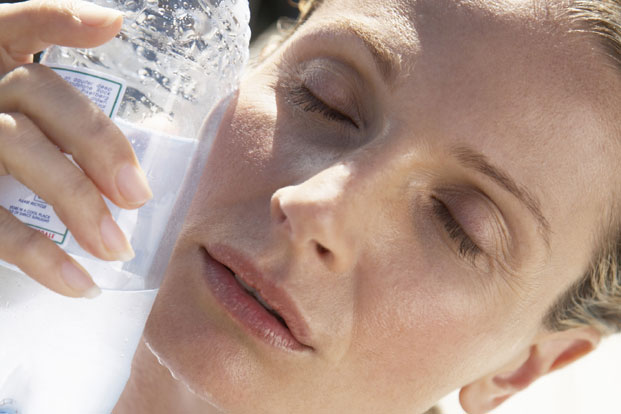Everyone gets thirsty from time to time. But the condition known as dehydration is another story, one with potentially life-threatening consequences if it becomes severe. The good news is that you can reverse dehydration easily in all but extreme circumstances.
Surprisingly, most of us are dehydrated much of the time. Up to 75 percent of Americans may be dehydrated at any given moment, according to research by the Clinical Nutrition division of New York Hospital.
Because our bodies are mostly water, including 85 percent in our brains and 75 percent of our muscles, we need anywhere from six to 10 cups of water per day for optimal functioning. Think of it like a car needing oil or gas. Water makes humans run.
Not every liquid will help you stay hydrated. Coffee, alcohol, caffeine-laden beverages and even some teas act as diuretics, which contributes to dehydration. If you chronically go without water, it can contribute to fatigue, high blood pressure, kidney problems and headaches, among other issues.
Symptoms of Dehydration
Dehydration symptoms are easy to spot. First, you’ll feel thirst, usually accompanied by a dry mouth. Second, you’ll start to feel tired, even sleepy. Third, the skin turns dry and you’ll probably get a low-level headache. Fourth, on your bathroom breaks, you’ll notice less urine being produced and perhaps have a constipation issue.
Watch for the other symptoms of dehydration, which include few tears when crying, and in some cases, a light-headed feeling. Usually, those are the mild signs that you should have a few glasses of water to bring you back to normal hydration. But if you’re working outdoors, spending a lot of time playing in the sun or participating in vigorous athletic activity, you may see some of the more severe signs manifesting themselves.
Heat stroke is a potential condition that can arise when you become too dehydrated. At that point, mere water can’t bring back all the electrolyte fluids that help keep your body temperature regulated. If you’re sweating and then stop and start to feel extreme thirst or tiredness, it’s time for a water break. If you’re working hard, about a liter of water every hour is recommended to help maintain the body’s optimal function.
When severe dehydration kicks in, you may start to notice rapid heartbeat and breathing, a fever, high agitation or sleepiness, sunken eyes, and, in the worst-case scenario, delirium, unconsciousness or hallucinations. That’s when you need to seek medical professionals, who can administer intravenous fluids and help monitor your condition to bring you back.
How to Tell if Dehydration Is Setting in
Beyond thirst, keep a close eye on your urine. It should be light-colored under normal hydration situations. If it is dark yellow in color or even amber, there’s the potential for trouble. It’s suggested you drink a sports drink like Gatorade at that point to restore the balance in your hydration.
Of course, children and the elderly may have more severe reactions when dehydrated, and many won’t manifest the symptoms until hours after the fact. Anyone who is unusually irritable or much less active than they usually are after an afternoon in the sun should be watched. If diarrhea or black stool is present, and if the person has trouble keeping fluids down, it’s time to visit the emergency room.
Dehydration is a sneaky condition that doesn’t necessarily announce itself in major ways. Drying out the system, which is what dehydration essentially does, is a gradual process and people who are busy or distracted may disregard it. This is particularly true when traveling or camping, where access to regular water may be restricted by circumstances.
Beyond activity, it’s good to watch out for other things that can cause dehydration.
Sick? You’re at Risk
Those who suffer from diarrhea or vomiting can quickly develop dehydration as precious fluids are rapidly expelled from the body. It can happen in minutes as fluids, minerals, vitamins and electrolytes are all purged. Similarly, a high fever, particularly if combined with the other two issues, can bring on the rapid onset of dehydration.
People who sweat a lot lose a tremendous amount of water, and if they’re doing so in hot weather, it can happen even faster. Those with a low body weight are particularly susceptible, so keep an eye on children and older adults. It’s also possible to dehydrate in winter, so don’t be fooled by the outside temperature.
Excess sweating may occur when taking certain medications, including many blood pressure medications or an undiagnosed diabetic underlying condition. You may have increased urination, which can drain the system and leave you dehydrated. As we age, the body loses its ability to hold onto water, and the elderly lose a sense of taste and thirst, which, in turn, causes less interest in food and drink. Those who live alone or under supervised care in an assisted living or nursing home need to be encouraged to maintain a regular schedule of hydration.
Diabetics are at particular risk for dehydration because the body burns a lot of calories. Heart and kidney problems also can lead to dehydration issues.
Finally, dehydration can be caused by that old real estate maxim – location, location, location. If you live or work at high altitudes, your body may work overtime to adjust to the elevation. Problems typically begin about 8.200 feet above sea level, and the body’s effort to get more oxygen can speed up the entire system, increasing urination and breathing more rapidly, which expels water vapor.
Staying hydrated is really all about paying attention. If you’re active, take regular water breaks, particularly when it’s hot. Always have a bottle of water handy, and make sure children and older relatives are conscious of the need to stop and have a drink on occasion. If you follow these simple steps, it will go a long way toward preserving your water levels and lead to better health.

Leave a Reply